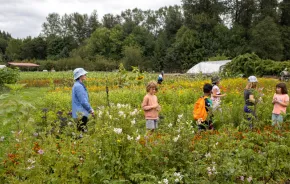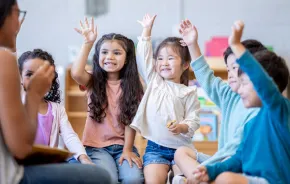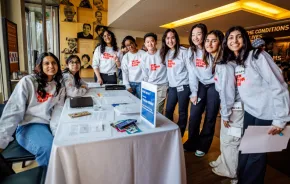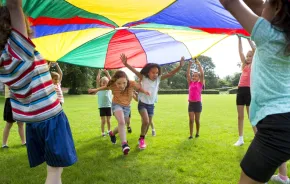We've covered a lot of territory in this column. We've offered tips on
ways to prepare your children for school socially, emotionally and
cognitively. We've suggested arts, dance and library programs, and have
touted the benefits of drama groups and movement classes.
Sometimes, it must seem that "Getting School Ready" means loading even
more onto your ever-enlarging parental to-do list.
That's why we're focusing on the schools themselves this month. What do
they do to get ready for your children?
Quite a bit, it turns out. Educators are looking to form connections.
They'd like to link parents to teachers, children to classes, families
to communities. Their goal? A smooth transition for every child
entering kindergarten.
Many schools start shaping that warm, welcome environment the year
before kids enter the classroom in September. It's an effort that
continues throughout the year.
Hawthorne Elementary in Seattle contacts each new kindergarten family
in the spring. There's a new family orientation in August, with
interpreters on hand to assist those needing translation. Children tour
classrooms and meet teachers -- and do that again at another
orientation for parents or guardians the first day of school.
In the fall, Hawthorne offers "Homework Night" with parents and staff,
who advise parents on ways to support learning. Hawthorne also hosts an
open house and PTA meeting in early fall, and is considering providing
"parent buddies," for new families, according to Hawthorne principal
Gloria Warren.
Hawthorne's "Kindergarten Ready" breakfast, slated for Oct. 16, is
aimed at child care providers. "Our alignment with these providers will
be a way for us to get preschoolers in our area more kindergarten-ready
by providing training and materials to day care providers and potential
kindergarten families," Warren says. "We hope that through this work we
will have entering kindergartners who have more readiness skills."
At Green Lake Elementary, families new to the school meet at a summer
picnic. Kindergarten kids and parents convene for "tea" in early
September.
Green Lake also asks the incoming kindergarteners to come in for
pre-assessments, says principal Cheryl Grinager. The assessments focus
on reading and math skills. "This way, we can learn more about the
students and place them in groups," Grinager says. "Then we are better
able to address their needs; otherwise, we're just putting them in
classes."
Preparing for diversity is a major focus for Laurelhurst Elementary
School, according to Principal Kathy Jolly. "The staff works to create
culturally relevant classrooms," she says. "When a child comes in, they
will see images of children like themselves -- in books, pictures and
welcoming messages."
The messages are translated for bilingual students. "We meet the
children where they are and build on their strengths," Jolly adds.
Shoreline School District educators study their school's standardized
test results and use the data to design programs for their students,
notes Linda Averill, principal of Shoreline Children's Center. "When
each school looks at its own assessment data, it shows us where that
school's strengths and weaknesses are."
Shoreline teachers are acutely aware they can't have a "one package
that fits all" plan, Averill says. "Each of our schools is different.
We focus on the population within the school."
It's in the student's interest -- and the school's -- to keep
connections and lines of communication open throughout the year,
Averill adds. She encourages parents to call their child's school and
introduce themselves to the secretary. "This is a good way to find out
about the school and become familiar with its programs," she says.
"It's never too early to get involved."
How can kindergarten be ready for me?
(Source: The Seattle/King County Getting School Ready project)
My school experience will be best if my early childhood educators,
kindergarten teachers, staff, parents and family members work together
to help me learn. You can:
- Share with each other what I know and what I can do.
- Share things happening in my life that might affect how I feel and act.
- Find out about any special needs I have.
- Let my family know about their legal rights in the school.
- Let my family know about school and community services.
- Tell my family what is happening at my school, what I am learning and what I am expected to know.
- Provide school information in my home language.
- Find a trained interpreter if my family needs one when meeting with my teacher.
- Help me practice saying my name, address and phone number in my home language and in English.
- Teach me about watching for cars and not talking to strangers.
- Teach me who to ask for help when I need it.
- Teach me the words to tell other grown-ups when I need to go to the bathroom, or am feeling sick or hurt.
- Help me practice going to the bathroom, washing my hands, dressing, and tying my shoes.
- Encourage me to try things I've learned before I ask my teacher for help.
Linda Morgan writes frequently on education issues for ParentMap.









